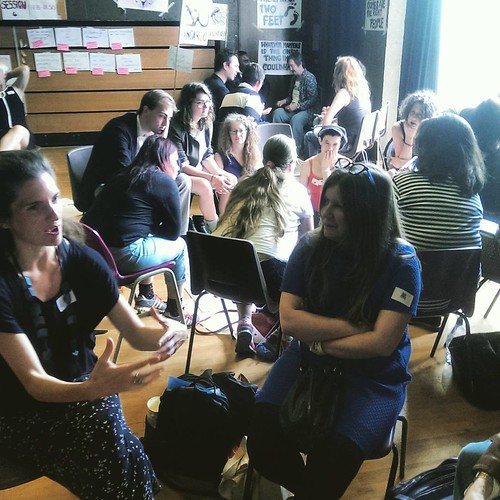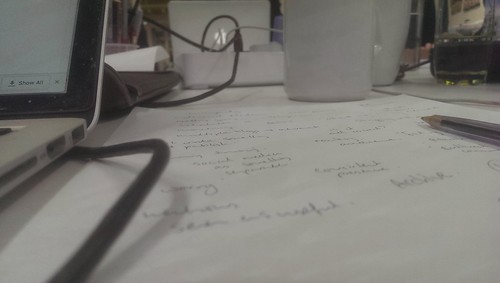TL;DR – I’m going to open as much space as I can, all around the UK, before the General Election to talk about power and politics and us at a much deeper and more practical level than is available online. There’s a Loomio Group Facebook Group to join if you want to help make it happen but there will be other ways of getting involved emerging quickly. As usual, this won’t be for everybody, but it should be for anybody who wants it.
Whether we like it or not, we are going to have another national vote on who should be in charge of whatever we want to do next as a country. It will be on the 8th June, which is soon, it’s fifty days time. Fifty days ago was February 28th – do you remember Pancake Day this year? That was fifty days ago today, that’s how long we’ve got.
Yesterday it became clear to me that this was the time to do a thing I’ve had on the back burner for some time. Ever since the surprises of the 2015 general election and even more so after last year’s referendum result, I’ve been thinking about how to get people together for a better sort of political conversation.
My Facebook feed yesterday was full of extremes – glee and despair, hatred and derision of each of the major party leaders. Lots of people saying “This is the only sensible way to vote” and “This is what I’m going to do and I expect you to do so too”. I saw calls for reasonable, collegiate debate (by smug, privileged bastards!) and calls to erect the barricades (by loonies!).
How did it get like this? My simplistic answer is that it’s only really like this when we talk to each other online and face to face we have a different experience – it’s less comfortable, sometimes more confronting and it’s not straightforward to just turn the other person off in the way that you might close down a Facebook tab in your browser, but it actually moves things on somewhat.
I’ve been really reviving my Open Space Technology practice over the last couple of years. It’s the sort of minimal organisation for productive, creative conversations that makes most sense to me. It is a very different experience from other face-to-face gatherings let alone any online argument or the sort of analysis you see in mainstream media. And, of highest importance, it is a form that gives power back to participants to decide what they want to talk about and work on – pretty much every other kind of political event has an agenda set by a party or is about a niche subject or has an angle and there are people in charge and people who mostly sit and listen. That’s not the sort of conversation I want to have either. So this is what I want to spend my time doing for the next seven weeks:
- Organise and facilitate as many day-long Open Spaces as I can up to Wednesday June 7th.
- The long form title I’ve got so far is “Having said all that, what are we going to do about the place that we find ourselves in today?” – to break it down:
- Having said all that – by which I mean all the things that have been said again and again on Facebook, Twitter and social media and regurgitated in mainstream media. So, putting all that aside…
- What are we going to do about [this] place – I want to do these in large cities all around the UK and I want to root the conversation in a local-ish context – So what are we going to do about Birmingham or Aberdeen or Plymouth or Brighton?
- [This] Place that we find ourselves in today – So not only is this the physical place but it’s also the political, economic, social or technological place and, even more subtly, it’s the place we find ourselves in metaphorically, we find ourselves by looking at our environment – how do you find yourself, what to you see of yourself reflected in the environment of York or Belfast?
- So that’s quite rich, I think. A wide and deep field in which to ponder power and how we might change the way power is used and distributed in our society.
- Or we might just go for “Oh yeah Politics – WTF, right?!?!?”
- In private conversations I’ve had about this so far, the most audacious target has been thirty events. I think that might be the end of me if I did every one, but it’s a nice juicy target isn’t it?
- I’m aiming for gatherings of around 100 people (though more if we can get large enough venues – and free/cheap ones at that)
- I’d like to be able to pay myself for full-time work on this – a minimum of London Living Wage.
- I’d like to be able to pay others to help, probably 1 full-time equivalent, not necessarily one person perhaps one person per location or whatever.
- The other main expense will be travel (by train wherever possible) – let’s have fun tweaking the timetable to minimise these costs!
- I will be looking for accommodation when needed with local friendly folks wherever possible (it’s always possible)
- We should raise money for this and other costs through a mix of sponsorship, crowdfunding and donations on the door. If there’s a surplus at the end we’ll have a democratic way of deciding what to do with it.
- There should be an easy to use blog/CMS for people to write reports of their sessions.
- And the whole process should be specced simply but tightly enough for others to be able to pick up the format and do it locally if I can’t get to where they are or need to work on a smaller scale.
I need your help with organising: crafting an invitation; working out a timetable; sourcing free venues; getting sponsors; thinking about the money and other logistics. I’m giving myself a few days to work on things before doing the first event before the Bank Holiday on May Day (yes, the next couple of weeks).
Although comments here are welcome, there’s a Facebook Group to join, come and join in, please and thankyou.
Working quickly and alone for now so please forgive (but alert me to) any clumsiness, excessive vagueness or gross mistakes, thankyou.







